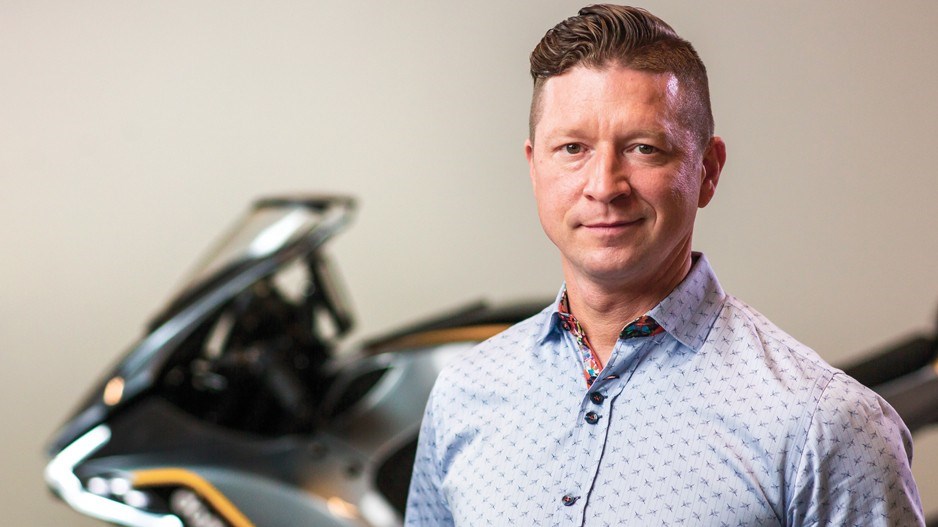Jay Giraud figures he’s logged some 64,000 kilometres on the road while performing CEO duties over the past four years. The mileage isn’t from flights to business conferences or investor meetings, but from research and development for the electric vehicle (EV) company he co-founded in 2017: Damon Motors Inc.
That R&D focus is rapidly shifting towards commercialization after Damon raised US$30 million from investors in March and broke ground earlier this month on a 110,000-square-foot manufacturing plant in Surrey capable of producing 40,000 electric motorbikes a year.
“We don’t take the time to breathe,” Giraud said about the company’s rapid shift from developing collision safety systems for motorcycles to becoming a B.C.-based EV manufacturer.
Greater Vancouver is not exactly Motor City – even for Canada, where Ontario serves as the centre of the country’s auto industry. But Giraud said the region’s clean-technology know-how can’t be matched in other locations, owing to Ballard Power Systems Inc.’s (TSX:BLDP) knack for spinning off so much talent ever since the early 1980s.
“I don’t know if it’s rivalled really anywhere else other than maybe Silicon Valley,” he said.
But there are also practical purposes behind the launch of an auto-manufacturing plant in Surrey, which will sit close to the Scott Road SkyTrain Station and the Pattullo Bridge.
Giraud said having a vehicle manufactured where the company is headquartered – in the same way that motorbikes from Ducati Motor Holding S.p.A. are both designed and built in Italy – helps with marketing. A cleantech vehicle built and designed on the West Coast bolsters its cachet, according to the CEO.
Prices for the Damon bikes range from US$17,000 to US$40,000, depending on the model, and Giraud said revenue is expected to hit nearly $1 billion annually by 2025 when another manufacturing plant in Latin America is also expected to be up and running. By then, the company will be able to produce 100,000 electric motorbikes annually.
Another practical consideration is a plan to continue developing new iterations of the motorbikes.
“Aside from the cleantech manufacturing know-how that exists in Vancouver, which does not exist nearly to the extent in Ontario, for example, is we get a lot less snow over here, and we’ve got vehicles with two wheels and not four,” Giraud said.
“That’s a big one – being able to ride and test and develop year-round. And at this early, early stage of the business’ trajectory we need manufacturing and R&D to be shoulder to shoulder.”
Other local EV manufacturers have charted other paths during their own commercialization efforts.
Vancouver’s GreenPower Motor Co. Inc. (NASDAQ:GP) assembles its electric buses in California. Fellow B.C.-based EV company ElectraMeccanica Vehicles Corp. (Nasdaq:SOLO) has a manufacturing hub in China, and announced earlier this year a 225,00-square-foot plant would open in Arizona in 2022.
“We wanted to build an assembly facility for the U.S. so that we can have a made-in-U.S.A. product,” Paul Rivera, ElectraMeccanica’s former CEO who selected the Arizona site, told BIV in the spring. “But the other part is that we are really looking to build out an engineering technical centre.”
Rivera added that the Vancouver company also needs to mitigate against the potential for tariffs being slapped on its EVs entering the U.S. from China.
Giraud echoed those sentiments. He noted that “when you go to places like China or India, you give up so much control.”
While the companies are taking different routes to commercialization, both plan to keep their manufacturing close to their R&D centres, albeit in different cities than where the corporate headquarters stand.
Meanwhile, Damon’s commercialization plans come amid rising demand for EVs.
A July 2020 Deloitte Inc. report forecast sales of electric vehicles will reach 25.3 million by 2030, while plug-in hybrid vehicle sales will reach 5.8 million units. The combined 31.1 million units far exceed the 2.5 million sold in 2020. And demand for Damon’s motorbikes has continued growing each month since pre-orders launched, according to Giraud.
The company did $4 million in orders last month – a new record – after posting $3.58 million in July and $3.68 million in August. This comes before any of its electric motorbikes have been delivered to customers from the Surrey facility owned by Bosa Properties and built to Damon’s specifications.
There will be about 300 manufacturing jobs based at the facility; another 500 office jobs will also be there to cover everything from R&D to marketing.
“We’re really lucky to have been selected,” Giraud said about the 10-year lease with Bosa.
“There are risks that come with supporting a startup and being able to find a building in a prime location, brand-new, state-of-the-art facility [with] all the right kind of creature comforts that you need to support hundreds of workers.”




